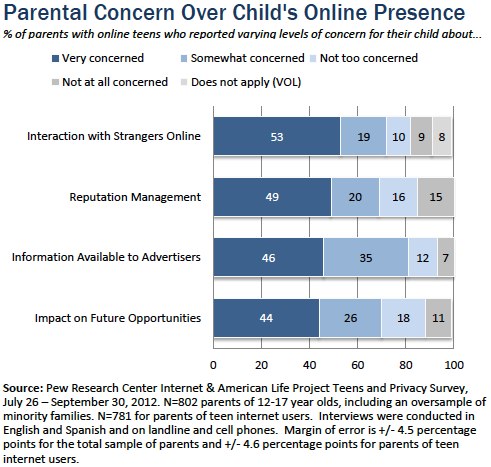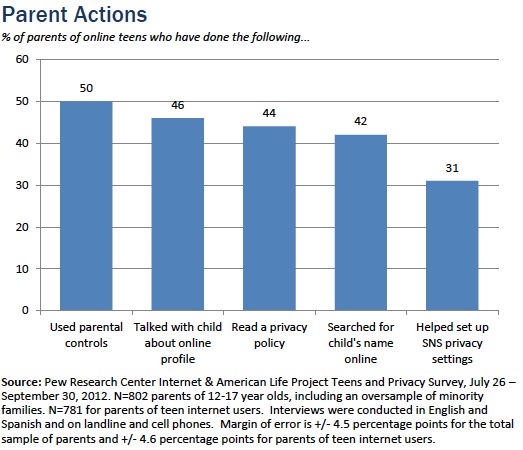Most parents of teenagers are concerned about what their teenage children do online and how their behavior could be monitored by others. Some parents are taking steps to observe, discuss, and check up on their children’s digital footprints. A new survey of 802 parents and their teens shows that:
- 81% of parents of online teens say they are concerned about how much information advertisers can learn about their child’s online behavior, with some 46% being “very” concerned.
- 72% of parents of online teens are concerned about how their child interacts online with people they do not know, with some 53% of parents being “very” concerned.
- 69% of parents of online teens are concerned about how their child’s online activity might affect their future academic or employment opportunities, with some 44% being “very” concerned about that.
- 69% of parents of online teens are concerned about how their child manages his or her reputation online, with some 49% being “very” concerned about that.

Some of these expressions of concern are particularly acute for the parents of younger teens:
- 63% of parents of teens ages 12-13 say they are “very” concerned about their child’s interactions with people they do not know online.
- 57% of parents of teens ages 12-13 say they are “very” concerned about how their child manages his or her reputation online.
A notable number of parents, especially parents of younger teens, are taking steps to act on these concerns:
- 59% of the parents of teen users of social networking sites (SNS) have talked with their child because they were concerned about something posted to their profile or account. (That translates to 46% of parents of all online teens.)
- 39% of the parents of teen users of SNS have helped their child set up privacy settings for a social networking site. (That translates to 31% of parents of all online teens.)
In addition to such direct interventions, some parents are monitoring their children on family computers and in online searches:
- 50% of parents of online teens (not just the teens who use SNS) have used parental controls or other means of blocking, filtering, or monitoring their child’s online activities—a number that has remained almost unchanged since last year.
- 42% of parents of online teens have searched for their child’s name online to see what information is available about him or her.
- In addition to these activities, 44% of parents of online teens say they have taken the step of reading the privacy policies of websites or social networking sites that their child is using.

The survey also finds that a growing number of parents are becoming social media users themselves:
- 66% of all parents who have a child between the ages of 12-17, say they use a social networking site, up from 58% in 2011.
- There is great variation according to the parent’s age; 82% of parents under age 40 say they use SNS, while only 61% of parents over age 40 use the sites.
- Mothers and fathers are equally likely to use SNS, but parents who are college-educated exhibit higher levels of engagement with social media.
While parents may forge connections with their teens on social media in order to passively observe them, many are also actively engaging with their children and making their presence known. Half (50%) of parents who use social media (and who also have teens who use the sites) say they have commented or responded directly to something that was posted to their child’s profile or account. Mothers and fathers of children of all ages and across all demographic groups are equally as likely to engage with their child’s profile in this way.
About the survey
These findings are based on a nationally representative phone survey of 802 parents and their 802 teens ages 12-17. It was conducted between July 26 and September 30, 2012. Interviews were conducted in English and Spanish and on landline and cell phones. The margin of error for the full sample is ± 4.5 percentage points. In collaboration with the Berkman Center for Internet & Society at Harvard, this report also includes quotes gathered through a series of exploratory in-person focus group interviews about privacy and digital media, with a focus on social networking sites (in particular Facebook), conducted by the Berkman Center’s Youth and Media Project between May and December 2011. The team conducted 16 focus group interviews with roughly 120 students.




